
Formal classroom learning experiences that support sustainable behaviors outside the classroom necessarily must bridge students’ home and school lives, as knowledge and practice learned in the classroom is implemented outside of school. To this end, we study the impact of the Green Ninja Energy Tracker curriculum, which uses students’ home energy data in the classroom to promote engagement in climate change and conservation behaviors. Data is drawn from class observations, a focus group, and pre- and post- surveys of a pilot implementation of this curriculum in a diverse 12th-grade Earth Science classroom at an alternative school. We investigate what factors contributed to student engagement in learning about and participating in energy conservation behaviors. We found that students were engaged by the immediacy of tracking their energy use in near-real time, and were motivated by the economic benefits experienced as a direct result of changing their behaviors. In addition, students reported discussing and problem-solving energy use with their families, and surfaced considerations that informed which energy behaviors were implemented and why. Students also reported high levels of personal agency in taking action on climate change, but were pessimistic about the likelihood of society as a whole taking action. We suggest that this pilot demonstrates the potential power of connecting the varied places of students’ experience by bridging home and school lives through energy tracker software as a catalyst for developing scientific expertise and engagement, and supporting energy conservation behaviors.
Continue Reading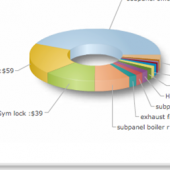
This paper will explore the Energy for ME program, funded by the Environmental Protection Agency and the National Science Foundation, which worked across formal and informal K-12 environments to bridge the gap between society, science, and the environment. Specifically, this article documents how Energy for ME integrates three experiential education pedagogies (place-based education, inquiry, and project-based learning) in combination with real-world electricity data in order to impact energy consumption within participating communities. Energy for ME schools and communities have saved over $135,000 in homeowner electricity costs, 900,000 lbs of carbon, and 1,000,000 kWh of energy) in electricity costs over the 3 years of the project.
Continue Reading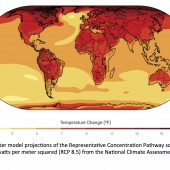
Energy education, vital though it is, remains incomplete if it doesn’t explicitly address the impacts of human activities, specifically the combustion of buried solar energy/fossil fuels, on the environment in general and climate system in particular. Projections based on current emission trends indicate a likely increase of the radiative forcing of energy in the Earth system from around three waters per meter squared today to over eight by the year 2100, substantially heating the planet in the process. Efforts to avoid or minimize the connection between human energy consumption and changing climate amount to a form of science denial through omission. In order to address the causes, effects, and risks of climate change and appreciate the range of options to minimize negative impacts and maximize resilience, energy and climate literacy efforts should be combined and ideally infused throughout the curriculum.
Continue Reading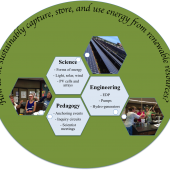
In August 2014, twenty-nine K-8 teachers from eleven Vermont schools engaged in the science, engineering and pedagogical practices of sustainable energy education. This week long workshop was organized by the Vermont Science Initiative (VSI), with an engineering and science instructor each from Norwich University and Lyndon State College respectively, and in partnership with the Vermont Energy Education Program (VEEP).
Teachers defined energy in terms of work, differentiated between transfers and transformations occurring across different energy forms, and gained a deeper conceptual understanding of renewable and nonrenewable energy sources. Opportunities for inquiry ranged from wind turbines, to electrical circuits, to light and Photovoltaic (PV) cells, and an energy bike. These, in combination with scientist meetings and a field trip to a nearby solar PV farm solidified their scientific literacy in the sustainable energy context. The teachers were also led through the Engineering Design Process (EDP) including concepts of design criteria and constraints to learn about sustainably engineering the energy components of systems. Teachers worked in groups to build an Archimedes Screw pump and determined the efficiency of a micro-hydro-generator. By the end of the week, post assessment test results revealed that the teachers had a 37% improvement in understanding various content areas.
By engaging elementary and middle school teachers in fun, hands-on exploration of sustainable energy we hope to bring this form of literacy to our youngest citizens, and future leaders and decision makers. The opportunity to continue engagement throughout the year with three follow-up sessions, and a forum to share the units they developed and best practices through the VT Agency of Education website will serve as a model for other stakeholders interested in implementing a similar program.
Continue Reading
Effective teacher professional development in energy education is essential to creating a sustainable future. This article highlights and describes three key components of the Wisconsin K-12 Energy Education Program (KEEP) that have led to two decades of increased statewide energy literacy. The success of the program can be attributed to supportive partnerships that guide staff, the development of an adaptive conceptual framework, and a professional development network for teachers. We offer these components as a guide for other energy education programs to promote future successes in teacher professional development in energy education.
Continue Reading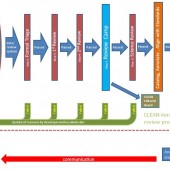
Recent changes in the climate system are mostly due to greenhouse gas emissions through increased energy use by society, which changes the distribution of energy in the Earth system. These changes highlight the importance of energy education. Energy consumption is at the source of and the solution to climate change. However, studies across the US and globally show that students’ understanding of energy and the connection between energy and climate is low. The Climate Literacy and Energy Awareness (CLEAN, http://cleanet.org) effort supports educators of middle school through undergraduate levels in their teaching about energy topics by providing an online, free collection of peer-reviewed, classroom ready resources that span the entire breadth of energy and climate education. The web portal also provides materials for teachers to learn more about how to teach about energy and climate. A vibrant community supports educators and other stakeholders in their efforts.
Continue ReadingReimagining energy education involves moving beyond the basics of energy use, conservation, and efficiency toward a more robust exploration of energy. This exploration should address energy access and equity, the impacts of energy choices, and personal attitudes, beliefs, and behaviors related to sustainable energy solutions. One approach to encourage this evolution is to use a learning context that inspires educators and students to delve deeply and methodically into the social, economic, and environmental interconnections of energy issues—in other words, to learn about energy within the context of global sustainability. In this article, we share Facing the Future’s definition of global sustainability education (GSE), explain why GSE is an effective context for energy education, and use Facing the Future’s newest energy curriculum to demonstrate how GSE can be employed to develop engaging and rigorous interdisciplinary energy curriculum.
Continue Reading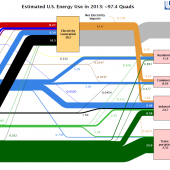
Energy services undergird all modern, industrial societies, yet economies based on fossil fuels are not sustainable. Insecurity of supply, particularly of oil, has sparked major geopolitical tensions and warfare. Pollution from use of fossil fuels and other energy sources has damaged local, regional, and global health. Greenhouse gases from fossil fuels have triggered concerns about the earth’s climate. Educational institutions are responding only slowly to these existential threats. This paper addresses the challenges facing students, faculty, and administrators as institutions move from simply providing technical education on the respective components of the energy industries to a more comprehensive program that also addresses the environmental, political, economic, cultural, and ethical contexts of energy literacy. Students at most institutions lack courses and programs outside of engineering and physical science. Only 8 percent of 1638 institutions have systematic, broad-based energy studies. The U.S. Department of Energy has supported initial efforts to develop this field. Development includes helping students move from energy studies to employment. Nevertheless, student interest is high. Faculty teaching sustainable energy have generally self-taught, and faculty employment opportunities in energy studies seldom exist. A faulty member delivering energy studies generally lacks a community of supporting peers. Those in this interdisciplinary field may fear the effort will not be rewarded by the institution. Nevertheless the intellectual rewards from developing energy studies are significant and motivating. Administrators face questions of balancing competing claims for institutional resources and face criticism from internal and external constituencies. In addition, they must guide the institution to promoting, enabling, and rewarding interdisciplinary work. Development of energy studies, however, positions the institution for better internal operations and for meeting critical societal needs. We conclude that energy education is both easy and hard, but it can and must be done.
Continue Reading